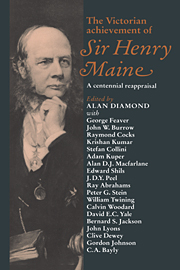Book contents
- Frontmatter
- Contents
- Notes on contributors
- Foreword by Sir John Lyons
- Introduction
- 1 The Victorian values of Sir Henry Maine
- PART 1 MAINE AND THE IDEA OF PROGRESS
- PART 2 MAINE AND THE SOCIAL SCIENCES
- PART 3 MAINE ON LAW, LEGAL CHANGE AND LEGAL EDUCATION
- 11 Maine and legal education
- 12 Maine and legal education: a comment
- 13 A wake (or awakening?) for historical jurisprudence
- 14 Further thoughts on Maine's historical jurisprudence
- 15 Fictions, equity and legislation: Maine's three agencies of legal change
- 16 Law and language: a metaphor in Maine, a model for his successors?
- 17 Linguistics and law: the legacy of Sir Henry Maine
- PART 4 MAINE AND INDIA
- Appendix: the conference programme
- Bibliography
- Index
14 - Further thoughts on Maine's historical jurisprudence
Published online by Cambridge University Press: 04 September 2009
- Frontmatter
- Contents
- Notes on contributors
- Foreword by Sir John Lyons
- Introduction
- 1 The Victorian values of Sir Henry Maine
- PART 1 MAINE AND THE IDEA OF PROGRESS
- PART 2 MAINE AND THE SOCIAL SCIENCES
- PART 3 MAINE ON LAW, LEGAL CHANGE AND LEGAL EDUCATION
- 11 Maine and legal education
- 12 Maine and legal education: a comment
- 13 A wake (or awakening?) for historical jurisprudence
- 14 Further thoughts on Maine's historical jurisprudence
- 15 Fictions, equity and legislation: Maine's three agencies of legal change
- 16 Law and language: a metaphor in Maine, a model for his successors?
- 17 Linguistics and law: the legacy of Sir Henry Maine
- PART 4 MAINE AND INDIA
- Appendix: the conference programme
- Bibliography
- Index
Summary
Popular Government, the last of Maine's publications, seems to me a profoundly pessimistic book, deeply depressing to read. Having come to doubt political progress, Maine regards with horror the prospect of the enfranchised mob throwing its weight on the lever of legislation: ‘we are’, he thinks, ‘propelled by an irresistible force on a definite path towards an unavoidable end — towards Democracy, as towards Death’ (PG: 170). Whether the life-cycle analogy is valid, I don't know, but I do know that it was a relief to turn back to Ancient Law, the younger book, full of optimism, and opening doors in so many directions.
Ancient Law has been much discussed in the context of Maine's own day, in the writings of Burrow, Stein and others, as well as in this volume, and rather than attempt to add to that, it seems to me that I should offer some remarks on what I think Maine has still to say to us today. I think the residual value lies in his method. Though Maine does not explain his methodology in any one place, there are remarks and recommendations scattered through his writings. These are well worth looking for, since they are often of current utility.
- Type
- Chapter
- Information
- The Victorian Achievement of Sir Henry MaineA Centennial Reappraisal, pp. 238 - 241Publisher: Cambridge University PressPrint publication year: 1991

